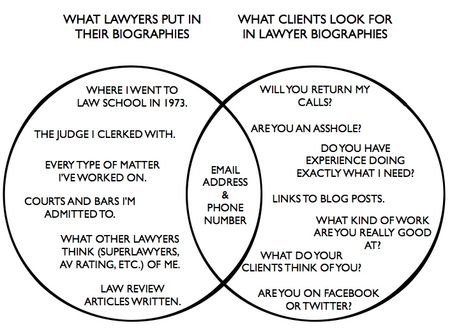
In response to the infamous Venn diagram by Matthew Homann that suggests that most of the information lawyers put on their bios does not answer prospective clients’ questions, I asked my lawyer and non-lawyer friends what information they wanted to see.

Their responses inspired me to write the most blatantly honest bio I could for myself:
Ruth B. Carter
Of Counsel (legalese for “independent contractor”)
Practicing law since 2012
Law School: Arizona State University
Other Degrees: Oregon State University – Honors Bachelor of Science in Psychology, Chemistry Minor; Master of Science in Counseling
Email: rcarter@venjuris.com
Practice Areas: Intellectual Property, Internet Law, Business Law, Litigation
Current Rate: $300/hour (as of January 1, 2023). Any work that requires me to drop-everything-and-put-out-this-fire will be billed at my “urgent” rate of $400/hour.
What I Am Really Good At:
- Persuasive Writing – like nasty-grams and court filings
- Contracts, including terms of service and privacy policies – I use my past work as guidance
- USPTO Trademark Applications – including keeping you informed throughout the process, even when the update is that there is no update
- Explaining how the law works in plain English
Have I Worked on Cases Exactly Like Yours?
Please email me a summary of your situation, and I’ll let you know. If I’ve blogged or created a video about your type of legal problem, I’ve probably worked on a similar case.
Will I Work my Ass Off for You?
Yes.
Do I Take Cases on Contingency?
No.
What About for Partial Ownership of Your Startup?
Absolutely not.
Can You Have Payment Plan?
Officially, no. In reality, probably yes.
I get that legal work is expensive, and not everyone has thousands of dollars in their rainy day fund. In general, I don’t mind if clients pay me over time as long as they’re making consistent payments every month. The partners at the firm aren’t a fan of this, but they don’t make a fuss if you’re paying your balance down every month. You must pay your filing fees before I will file anything on your behalf.
Few things make me feel more disrespected than clients who ghost me in paying their bill when I’ve worked my ass off for them. Additionally, I’m in an eat-what-you-kill environment. My income is directly related to my clients paying me for my work. I do not have a guaranteed salary.
What do I Like about Being a Lawyer?
I get to work on challenging projects, and I get to help people in a way that they often can’t do for themselves. The areas of IP and internet law are constantly evolving, and the law, at best, is barely keeping up with technology.
How Long Do I Take to Respond to Emails?
My goal is to respond to emails within 24 hours, 48 hours if I’m super busy. If you haven’t heard back within 72 hours, please ping me again. Your message may have gotten buried in my inbox.
Can You Call Me?
Unless I’ve told you to call, please don’t call me. My outgoing message says, “Don’t leave a voicemail. Send me an email instead.” If you call when I’m not expecting it, I probably won’t pick up, and here’s why:
When I’m doing client work, I want to give the client my undivided attention. If you make my phone light up (I turned the ringer off years ago), you will distract me, and it will take me that much longer to get my focus back. Ditto for the blinking you-have-a-message light, which will turn on even if you don’t leave a message. This is the same level of attention you will get when I’m working on your case.
Am I an Asshole?
No. However, I regularly say that I’m not a nice person; I occasionally do nice things.
Will I Call You Out When You’re Wrong?
Of course. That’s my job. I will listen and validate your perspective, and then tell you how it really is. Sometimes the law doesn’t make sense.
Do People You Respect Like Me?
I hope so, but you’d have to ask them. About half of my clients find me through word-of-mouth referrals. I have a few testimonials on my About page, and you can always look up my recommendations on LinkedIn.








